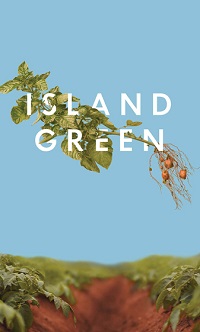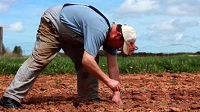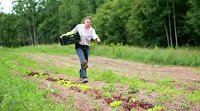| ________________
CM . . .
. Volume XXI Number 35. . . .May 15, 2015
excerpt:
Nevertheless, there are farmers who have chosen to “go green” and to farm organically, working with nature instead of controlling it. Farming organically means understanding the soil and seeing insects and weeds as sign posts, rather than as nuisances to be eradicated. To farm organically is to take some risks, but all farming is risky, and the current dependence on sprayed pesticides certainly exposes the population to high levels of toxins. Perhaps as a result of pesticide spraying, PEI boasts high rates of cancers and respiratory illness. Even farmers who would prefer not to spray find themselves doing so because of consumer demands for high yields of their product. Nor do organic farmers find themselves supported by a large body of scientific research; research needs financial support and researchers are not likely to be funded by the big agri-corporations who stand to lose if demand for their supplies of chemicals and fertilizers diminish. It’s a tough choice, aggravated by consumer expectations of cheaply priced food. In fact, cheap food has high cost, but most supermarket patrons pay little attention to the plight of the producers, preferring instead to complain as their grocery bill continues to rise. Those who choose to buy their food at farmers’ markets or outlets which specialize in organic food may appear to pay more, but, in fact, the prices they pay are, on many levels, more fair to the producer and certainly better for the environment. Nevertheless, organic farming is increasing on PEI. For it to succeed, farmers will have to find more markets, and those markets won’t be at the big box grocery stores patronized by so many who truly believe that they are getting a great deal on high quality food products. As well, for farmers to be able to transition to organic farming, there must be political will and support to assist them. Organic farmers are a small group on a small island, but they have an opportunity to be in the forefront of agricultural change. Island Green shows us the verdant beauty of the island, but more importantly, it highlights the commitment of those who wish to continue to live and work the land that they love and have nurtured for generations. It reminds the viewer that food security can be tenuous and that North Americans really don’t appreciate the abundance of food stuffs available to them at reasonable prices And for those who dwell in cities and have few, if any connections with agriculture and food producers, it is a reminder that farmers and farming cannot be taken for granted. We, as consumers, have to provide economic support that is fair and just. We all need to eat. Island Green has a place in senior high school geography classes, especially as agriculture and food production are so much a part of human geography; additionally, classes in foods and nutrition might also find it useful. Everyone hears so much about “organic food” – it’s worthwhile to understand how that food is produced. Highly Recommended.
Joanne Peters, a retired teacher-librarian, lives in Winnipeg, MB.
To comment on this title or this review, send mail to cm@umanitoba.ca.
Copyright © the Manitoba Library Association. Reproduction for personal use is permitted only if this copyright notice is maintained. Any
other reproduction is prohibited without permission.
CM Home |
Next Review |
(Table of Contents for This Issue - May 15, 2015.)
| Back Issues | Search | CM Archive
| Profiles Archive |

 If you ask a Canadian what comes to mind when you say the name of the province, Prince Edward Island, he or she will probably reply either “Anne of Green Gables” or potatoes. Island Green is not about Anne, nor is it specifically about potatoes. But, it is about the family farm crisis on the 4 million acre island, of which 500 thousand acres are farmland, surrounded by water. Agriculture is having a hard time everywhere, and PEI is no different. Despite the existence of “food palaces” (well-stocked supermarkets carrying a seemingly endless variety of food products), the prices of farm-produced commodities continue to drop. If farmers on the Island want to continue to hold onto family farms that have passed down through generations, they’re going to have to find a new markets for their products.
If you ask a Canadian what comes to mind when you say the name of the province, Prince Edward Island, he or she will probably reply either “Anne of Green Gables” or potatoes. Island Green is not about Anne, nor is it specifically about potatoes. But, it is about the family farm crisis on the 4 million acre island, of which 500 thousand acres are farmland, surrounded by water. Agriculture is having a hard time everywhere, and PEI is no different. Despite the existence of “food palaces” (well-stocked supermarkets carrying a seemingly endless variety of food products), the prices of farm-produced commodities continue to drop. If farmers on the Island want to continue to hold onto family farms that have passed down through generations, they’re going to have to find a new markets for their products. Organic farming is one possibility, although it’s hardly a new concept on PEI. Prior to the industrialization of farming in the post-1945 decades, all farming on the Island was essentially organic. Farms were smaller, and dairy or other types of farms could be found between the big fields of potatoes. Farmers of past generation had an understanding of the interaction between healthy soil and other environmental factors. But, increased dependence on chemical interventions in the form of herbicides and pesticides resulted in higher yields, as well as soil imbalance, which continue to be treated with more chemicals. Now, agriculture on PEI is all about potatoes, and whenever agri-business commits to a monoculture, problems are bound to ensue.
Organic farming is one possibility, although it’s hardly a new concept on PEI. Prior to the industrialization of farming in the post-1945 decades, all farming on the Island was essentially organic. Farms were smaller, and dairy or other types of farms could be found between the big fields of potatoes. Farmers of past generation had an understanding of the interaction between healthy soil and other environmental factors. But, increased dependence on chemical interventions in the form of herbicides and pesticides resulted in higher yields, as well as soil imbalance, which continue to be treated with more chemicals. Now, agriculture on PEI is all about potatoes, and whenever agri-business commits to a monoculture, problems are bound to ensue.